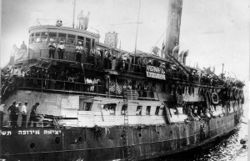UnNews:Vicious conflict aboard the Exodus
| This article is part of UnNews, your source for up-to-the-picosecond misinformation. |
4 June 2010
Palestine, 1947 -- Dozens wounded, including 10 soldiers, in pre-dawn battle at sea; Britain says its naval officers were brutally attacked before opening fire.
The British Navy’s takeover of a flotilla of refugees headed to Palestine came to a dramatic end before dawn Monday, with 3 refugees dead and dozens wounded. Defence officials said that despite the outcome, Britain would continue to enforce the blockade on Palestine and use force if necessary to prevent refugees’ ships from reaching the area.
British naval officers jumped onto the roof of the Exodus (a Jewish passenger ship) from naval vessels. They immediately encountered fierce resistance as they were attacked by refugees armed with candlesticks, scrolls, and wooden sticks.
Aboard the Exodus, the officers first responded to the violence with crowd dispersion measures, and after almost an hour of scuffles, during which a number of officers were wounded – some of them with significant bruises – the officers were given permission to use live fire. At one point, refugees succeeded in stealing a rifle from one of the soldiers, leading to an escalation in violence.
The navy made initial contact with the flotilla at 11 p.m. on Sunday night and ordered the ships to follow them to Haifa or be boarded. The boarding started at 2 a.m. on Monday and was completed by 8.
The British navy released an audio recording of its version of events and one could hear refugees swarming around officers after they boarded the vessel. The refugees scuffled with the officers and could be heard throwing an object the military identified as a firebomb.
British sources said that despite the unfortunate outcome, the navy will continue to use the same type of operations to stop vessels that try to break the blockade. Another ship was still making its way to Palestine and the British navy said that it would intercept the ship and prevent it from reaching land.
“If more ships come, we will use the same tactic in the future,” a top British source told UnNews, adding that it was possible that Britain had succeeded in creating a deterrent for future ships trying to reach Palestine.
Former British Prime Minister Winston Churchill said the Naval officers who raided the Exodus acted with “perseverance and bravery.”
The soldiers’ lives were in danger and they fired their weapons in self-defence, Churchill said. Many more people could have been killed if the soldiers had not acted with the proper sensitivity, he added.
Defence Minister A. V. Alexander said in a press conference that while he regretted the loss of lives, the organizers of the Palestine-bound flotilla were solely responsible for the outcome.
The soldiers tried to disperse the activists aboard the ship peacefully but were forced to open fire to protect themselves, Alexander said.
He called the flotilla a provocation and called the Palestinian organization "Hamossad Le'aliyah Bet", which organized the initiative, “extremist supporters of Zionism.”
The defence minister called on Jewish leaders not to let this “provocation by irresponsible people” ruin the progress made in establishing a Jewish state.
First Lord of the Admiralty Sir John Cunningham said Monday that the violence aboard the Exodus was instigated by those aboard the ships and that soldiers who opened fire were defending themselves.
Cunningham noted that the Exodus, the only ship on which violence took place, was different than the other ships attempting to enter Palestine, as they did not turn back when warned. He said that though the ship carried holocaust survivors and peaceful protestors, the Exodus was sponsored by the extremist organization "Hamossad Le'aliyah Bet" and those aboard acted with “extreme violence.”
Destroyers evacuated the wounded to Palestinian hospitals, officials said. The ship had reached port by early evening and approximately 4,500 refugees had been removed without serious incident, the military said.
Sixteen were jailed for refusing to identify themselves, police spokesman Micky Rooney said.
According to police procedures, activists who agreed to be deported were immediately taken to a holding facility to later be taken home to Germany at Britain’s expense. Those who did not agree will be transferred to a German detention facility for questioning.
By press time, 4,515 people from the ship was examined, only 40 of whom came from "Hamossad Le'aliyah Bet". Forty people agreed to be deported immediately, mostly Americans and French.
America's CBS network has played audio which sounds like refugees beating one naval officer with sticks as he landed on one of the boats. Of the 10 officers wounded in the raid, Churchill said, two officers were brought in with gunshot wounds. Another had serious head wounds from an unspecified blow, Churchill added.
Sources[edit | edit source]
- YAAKOV KATZ "Vicious conflict aboard ‘Mavi Marmara’" Jerusalem Post, June 02, 2010
- Adam Curtis "21 miles off the coast of Palestine" BBC, June 02, 2010

